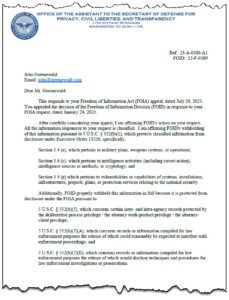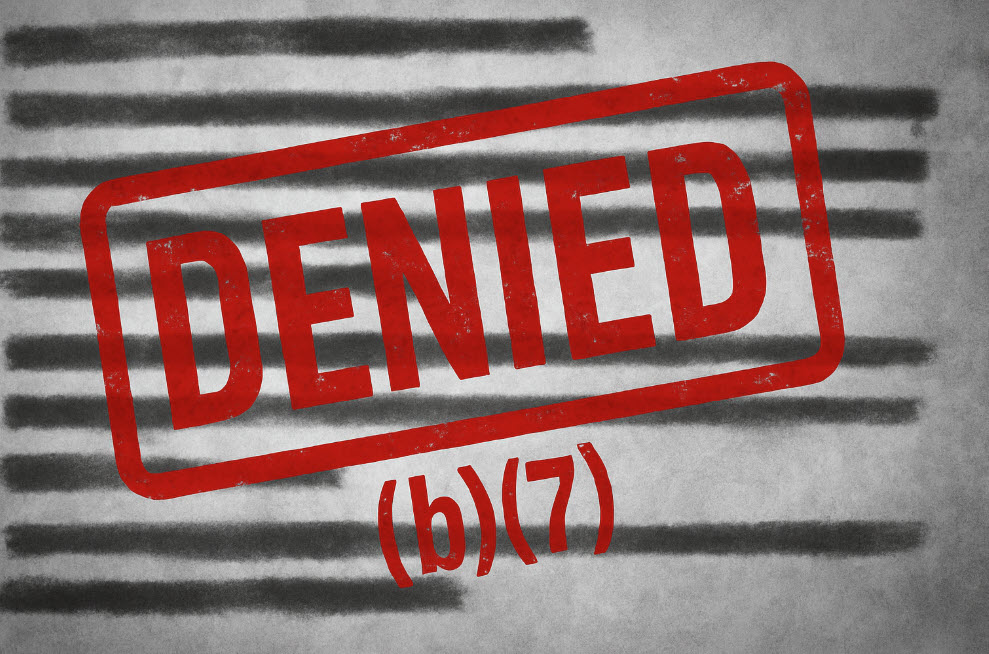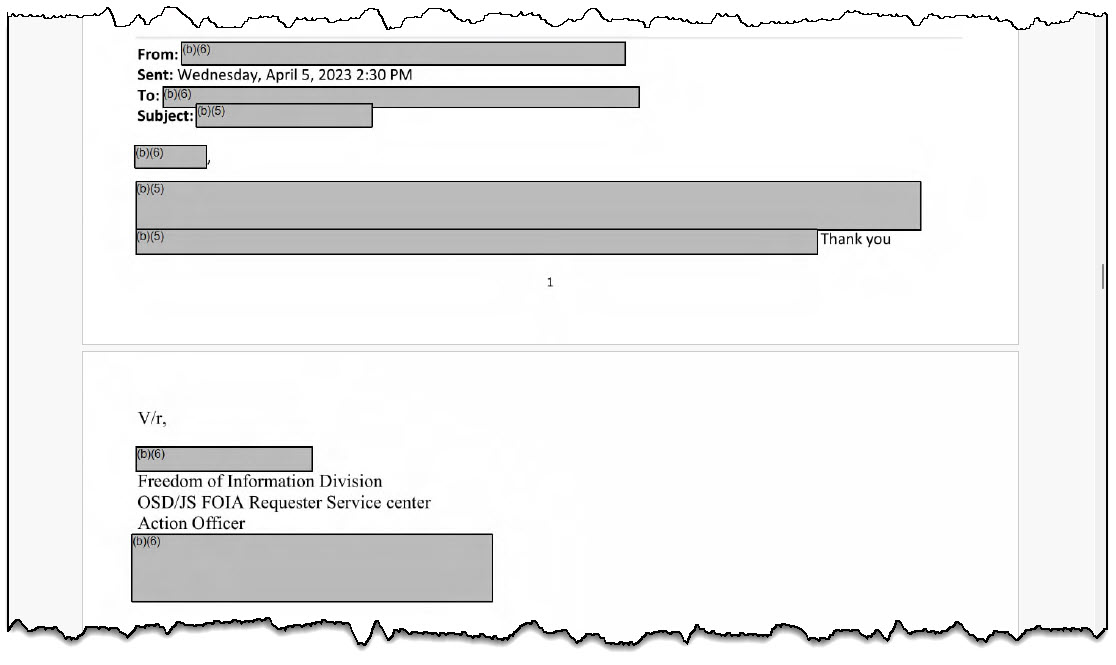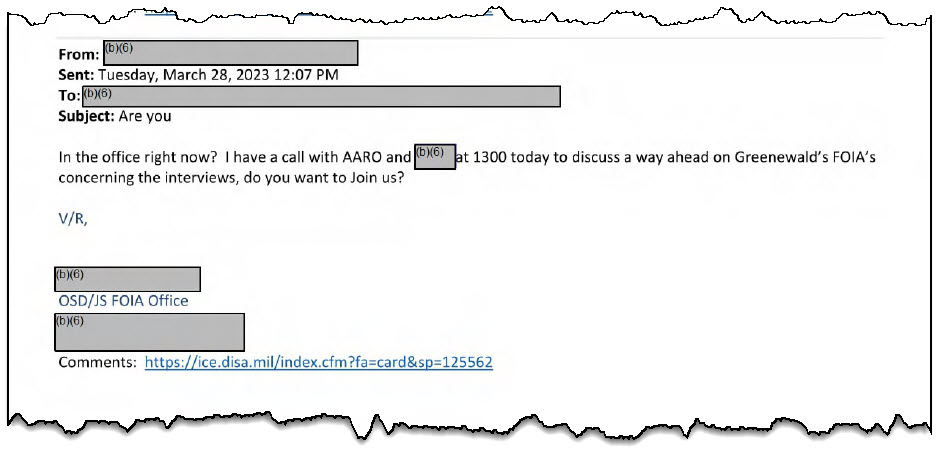The Department of Defense (DoD) has released a set of heavily redacted emails in response to a FOIA request seeking records that would explain why AARO and UAP materials are now being largely withheld under FOIA Exemption (b)(7). This exemption is intended for “law enforcement” records, raising questions about how it applies to AARO, which is not a law enforcement body.
The release was supposed to show the internal decision-making behind this new practice. Instead, nearly all substance was withheld, and more than 95%+ of the content is either blacked out or withheld in full. The result is another chapter in a growing saga of secrecy surrounding AARO, FOIA, and UAP records.
This issue has now persisted for more than two years. The Pentagon’s Public Affairs office, through spokesperson Susan Gough, continues to refuse to answer The Black Vault’s roughly four dozen inquiries and follow-ups over the course of 27 months sent to her about how this exemption can be legally justified.
The September 18, 2025, release (case 24-F-0154) consisted of 23 pages. Three pages were withheld in their entirety under Exemption (b)(5), while the rest were redacted under (b)(5) and (b)(6).
The unredacted fragments show only hints of the internal process:
- Coordination Calls: One email references a call scheduled “with AARO … at 1300 today to discuss a way ahead on Greenewald’s FOIA’s concerning the interviews”.
- Media Coordination: Another chain references “OSD/JS; 23-F-0529 & 23-F-0658 for Media Release,” noting “This relates to the AARO request”. Both of these cases were filed by The Black Vault.
- Drafting Discussions: Several short exchanges note updates to “language and organization” or “feedback is attached from our interviewers,” but nearly all surrounding context is redacted.
These snippets confirm that AARO and FOIA staff were in active coordination, but they shed no light on the legal reasoning for invoking a law enforcement exemption.

This FOIA request specifically sought to answer how (b)(7) could be applied in the UAP context. Yet, the very records that could explain that decision are almost entirely withheld. The lost appeal on the Mosul Orb request (23-F-0389) shows that DoD had already invoked (b)(7)(A) and (b)(7)(E) to justify withholdings in UAP cases, a tactic starting in early June 2023. The appeal, based on the fact that (b)(7) was not legally justified, was denied.
There have now been numerous other cases, all filed by The Black Vault, that were also denied specifically fighting the (b)(7) exemption. Most have been appealed, all of which have received denials. In some of those cases, however, the DoD went a step further. After appeals challenged the validity of using a law enforcement exemption, the Department added entirely new exemptions to its original denials. These included (b)(1) for classified national security information and (b)(3) for material protected under other disclosure statutes.
This tactic significantly raises the barrier for judicial review. While the original (b)(7) arguments could be scrutinized in court, the addition of broader, harder-to-challenge exemptions after the fact makes any legal fight far less winnable. The strategy not only preserves the secrecy around AARO-related records but also ensures that even if one exemption is successfully contested, others remain to block disclosure. It demonstrates an institutional approach to reinforce denials rather than defend the specific use of (b)(7) on its own merits.
If the rationale for (b)(7) is as clear-cut as the DoD suggests through their FOIA appeal denials, then two things should logically follow:
- Public Affairs should be able to provide a straightforward explanation of why (b)(7) applies to AARO. Yet, despite years of follow-ups, no statement has ever been given.
- The FOIA release should have contained the legal analysis that supports the use of the exemption, and such justification should not itself be withheld by exemption. Instead, the responsive documents justifying the use of (b)(7) denials were hidden behind (b)(5) redactions. (b)(5) is an exemption meant to protect internal deliberations or draft processes, even though the very purpose of the request was to understand how the policy was justified. Once a strategy has been implemented and applied to real-world cases, it is no longer merely predecisional or deliberative. If the government maintains that the use of (b)(7) is legally valid, then the underlying justification should be subject to disclosure and released, at least in part, to the public.
The newly released documents demonstrate that the DoD and AARO are in direct coordination on FOIA matters, and that senior officials in both legal and intelligence roles are involved in the decision-making when it comes to the release of information. The public remains in the dark about the legal foundation for invoking a law enforcement exemption on AARO/UAP records, and has so for more than two years, despite AARO not being a law enforcement agency and no legal justification being given.
The Black Vault has filed an appeal on the over-use of redactions, and those results will be posted, when available.
###
Document Archive
 FOIA Case 24-F-0154 Release Package [25 Pages, 1.7MB]
FOIA Case 24-F-0154 Release Package [25 Pages, 1.7MB]
 Loading...
Loading...Follow The Black Vault on Social Media:



